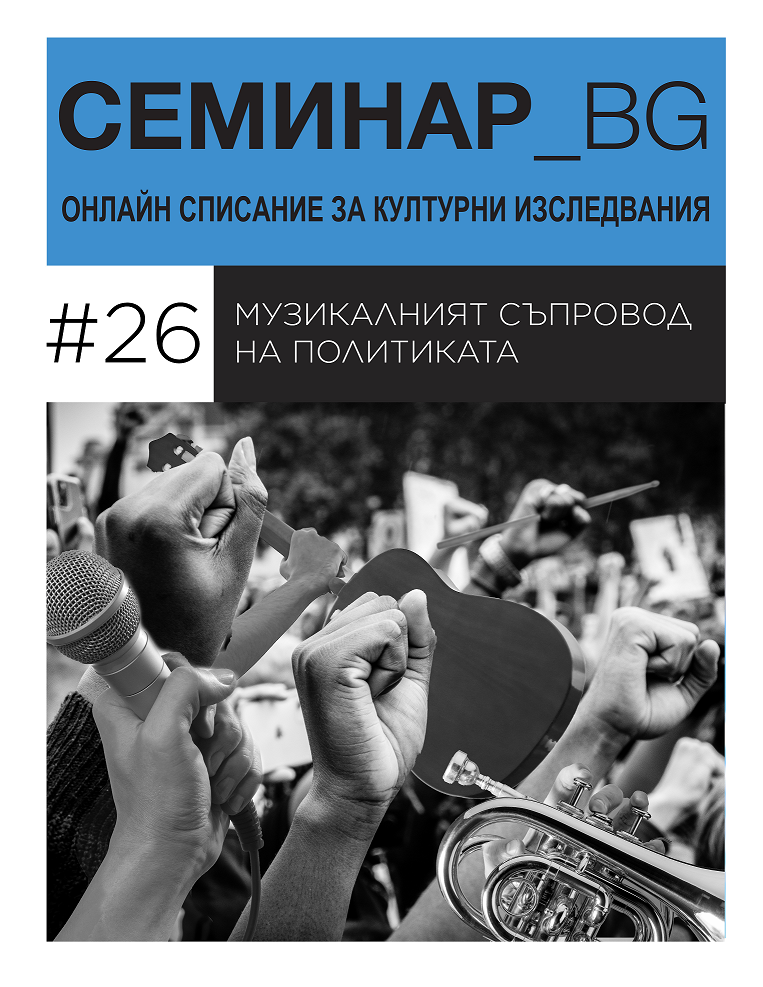Beyond Populism
The Case of "Song for Lena"
DOI:
https://doi.org/10.60054/SBG.2023.26.51-74Keywords:
politics, popular music, ethnopop, populism, Slavi TrifonovAbstract
The aim of this paper is to use the widely discussed “Song for Lena” as a case-study to explore the complex relationship between politics and (pop) culture. Insofar as these relationships often give rise to populist discourses, our main research task is to understand whether and how “Song for Lena” fits into the populist discourse of the political party ”There is Such a People” and its leader Slavi Trifonov. To this end, we take a multidisciplinary approach, using methods and concepts from the fields of cultural studies and political science, alongside research in music, literature, and communications. On the basis of several levels of analysis, we conclude that “Song for Lena” holds a lot of potential for constructing a populist discourse, which, however, remains untapped as it fails to construct an “elite” and “a people” in an antagonistic relationship.
References
Becker, Amy. 2020. “Applying Mass Communication Frameworks to Study Humor’s Impact: Advancing the Study of Political Satire”. Annals of the International Communication Association, 44 (3): 273–288.
Caiani, Manuela and Padoan, Enrico. 2023. Populism and (Pop) Music. London: Palgrave Macmillan.
De Cleen, Benjamin and Carpentier, Nico. 2010. “Contesting the Populist Claim on “The People” through Popular Culture: The 0110 Concerts versus the Vlaams Belang”. Social Semiotics, 20 (2): 175–196.
de la Torre, Carlos (ed.). 2019. Routledge Handbook of Global Populism. New York: Routledge.
Dichev, Ivaylo. 2019. Kulturni stseni na politicheskoto. Sofia: Prosveta.
Dimov, Ventsislav. 2001. Etnopopbumat. Sofia: Balgarsko muzikoznanie.
Dimov, Ventsislav. 2020. „Etnopop muzika i vlast na Balkanite (kak edna hibridna muzika stava meka sila v kulturnite voyni: mediyno-antropologicheski prochiti)“ In: Peycheva, Lozanka (sast.) Mekata vlast na populyarnata muzika v mediite (po primeri ot Bulgaria i Balkanite). Sofia: Universitetsko izdatelstvo „Sv. Kliment Ohridski“, 12–63.
Higgie, Rebeca. 2017. “Under the Guise of Humour and Critique: The Political Co-Option of Popular Contemporary Satire”. In: Davis, Milner J. (ed.) Satire and Politics. London: Palgrave Studies in Comedy, 73-102.
Kuipers, Giselinde. 2015. “Satire and Dignity”. In: Drees, Marijke and de Leeuw, Sonja (ed.) The Power of Satire. Amsterdam: John Benjamins, 19–32.
Laclau, Ernesto and Mouffe, Chantal. 1985. Hegemony and Socialist Strategy. Towards a Radical Democratic Politics. New York and London: Verso.
Laclau, Ernesto. 2005. “Populism: What’s in a Name?”. In: Panizza, Francisco (ed.) Populism and the Mirror of Democracy. New York and London: Verso, 32–50.
Machin, Tim. 2010. Analysing Popular Music. Image, Sound, Text. London: SAGE Publications.
Moffitt, Benjamin. 2016. The Global Rise of Populism: Performance, Political Style, and Representation. Stanford: Stanford University Press.
Ostiguy, Pierre. 2017. “Populism: A Socio-Cultural Approach”. In: Kaltwasser, Cristóbal, Taggart, Paul A., Espejo, Paulina O., Ostiguy, Pierre (ed.) The Oxford Handbook of Populism. Oxford: Oxford University Press, 104–133 .
Oswell, David. 2006. Culture and Society. An Introduction to Cultural Studies. London: SAGE Publications.
Petkov, Vladislav. 2017. „BeGevizia: izbori i referendum kato muzikalna klasatsia“. Seminar_BG, 14.
Petkov, Vladislav. 2022. “Dzhipka TV: kulturni izmerenia na zhivite vklyuchvania na Boyko Borisov vav Feysbuk”. Seminar_BG, 21.
Rolfe, Mark. 2017. “The Populist Elements of Australian Political Satire and the Debt to the Americans and the Augustans”. In: Davis, Milner J. (ed.) Satire and Politics. London: Palgrave Studies in Comedy, 37-72.Simpson, Paul. 2003. On the Discourse of Satire. Towards a Stylistic Model of Satirical Humour. Amsterdam/Philadelphia: John Benjamins Publishing.
Statelova, Rozmari. 2003. Sedemte gryaha na chalgata. Kam antropologia na etnopop muzikata. Sofia: Prosveta.
Way, Lyndon and Mckerrell, Simon. 2017. “Understanding Music as Multimodal Discourse”. In: Way, Lyndon and Mckerrell, Simon (ed.) Music as Multimodal Discourse. Semiotics, Power and Protest. London and New York: Bloomsbury Publishing.
Way, Lyndon. 2016. “Protest Music, Populism, Politics and Authenticity. The Limits and Potential of Popular Music’s Articulation of Subversive Politics”. Journal of Language and Politics, 15 (4): 422–445.
Wodak, Ruth. 2015. The Politics of Fear: What Right-Wing Populist Discourses Mean. London: SAGE Publications.
Downloads
Published
How to Cite
Issue
Section
License

This work is licensed under a Creative Commons Attribution-NonCommercial-NoDerivatives 4.0 International License.

